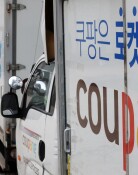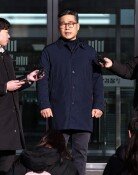Cabinet Reshuffle
President Roh Moo-hyuns cabinet reshuffling on December 2, marking the fourth year into the presidents term, was focused on not the improving the management efficiency of state affairs, but on repayment of favors to people. Thus the opposition parties have been criticizing the government that the reshuffling reflects not the needs of the people but political motives.
No difference
The new people in the Cabinet are from Cheong Wa Dae and Uri Party, all close acquaintances of president Roh, and are far from fresh.
Kim Woo-shik, the nominee for deputy prime minister and minister of science and technology, has been the Presidents Chief of Staff for the past year and a half (February 2004~August 2005). Lee Jong-seok, the nominee for the unification minister, has served as vice secretary-general of the National Security Council (NSC) since March 2003, and has been one of the closest people to the president in relation to diplomatic relations and security.
Jeong Se-gyun, nominee for commerce, industry and energy minister, has served as the chairman of the Policy Committee, floor leader of Uri Party, and the temporary chairman of Uri Party. Lee Sang-soo, the labor party appointee, was the secretary- general of the Democratic Party during the presidential campaign in 2002, and has been especially close to the president since the 13th session of the National Assembly.
Though not mentioned during the announcement today, but Uri party assemblymen Yoo Si-min, who is likely to become the minister of welfare, is also a close acquaintance of President Roh.
Cheong Wa Dae explained, The participatory government, as it enters into its fourth year, selected these people in order to complete state affairs without any problems. But the opposition parties are saying that the reshuffling has changed nothing.
Repayment appointments
There is a lot of talk about Lee Sang-soo, the labor minister nominee, that he was appointed by the president for undue reasons.
Lee was found guilty for his involvement in the Democratic Partys illegal funding during the 2002 presidential elections, but was pardoned last August. He entered the October 26 reelection for a seat in the National Assembly but failed. However, it is said that President Roh, by appointing Lee as a minister, is repaying his debt concerning presidential fund.
As for Lee Jong-seok, the appointee for the unification minister, has been wielding his influence in security-related ministries as the secretary-general of the NSC, which raised issues of arrogation.
Ever since Kim, the appointee for vice minister, resigned from his position as Chief Secretary last August, rumors of his entering the cabinet have run rampant. Indeed, many have long predicted the presidents repayment appointment.
Minister job is for resume?
It is said that appointing chairman Chang as the minister of commerce, industry and energy, is to buff up Uri Party members career resume. The same is said for assemblymen Yoo being pointed as a likely candidate for the welfare minister.
The same is also said for former unification minister Jeong Dong-young, who returned to the party, and former welfare minister Kim Geun-tae, and former Justice minister Chun Jeong-bae. Many claim the president provided them with minister experience to manage their political career experiences.
The opposition parties are criticizing this saying, is the minister job a bridge to prepare for presidency? One official of Cheong Wa Dae said, With the cabinet reshuffle chairman Jeong and Yoo both are now naturally in the list of presidential candidates. This shows that the opposition parties analysis is not completely wrong.
Second reshuffle in February = preparation for regional elections?
Cheong Wa Dae is giving a notice of a reshuffle in consideration of the May regional elections. If any current ministers have regional competitiveness, the government is willing to transfer them to another office.
Kim Wan-gi, the Cheong Wa Dae personnel secretary said during the briefing, If anyone wishes to run for the regional elections, they should be replaced late February or early March since the deadline for resigning from public office is April 1. And thus he announced possible reshuffle for regional elections.
One high-level government official told this correspondent, if the participatory government needs me to do so, then I will have to resign from my post and enter the elections.
The opposition circles expect that as the May regional elections is an important event for the future direction of the political situation, the second reshuffle may be more comprehensive, from the cabinet to high level Cheong Wa Dae officials.
In that case, the government will be criticized for rearranging ruling party members in the government not for the management of state affairs, but for elections and other political reasons.
Yeon-Wook Jung jyw11@donga.com







